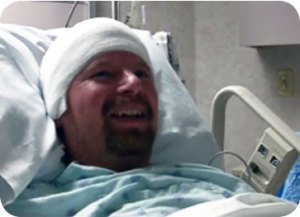 To those of you who have been reading my posts about the Live-tweet brain surgery, which was performed at the Regional Epilepsy Center at Aurora St. Luke’s Medical Center (Aurora Health Care) in Milwaukee, Wisconsin, I myself have been wondering how the patient is doing and what experience came out of the whole Twitter event.
To those of you who have been reading my posts about the Live-tweet brain surgery, which was performed at the Regional Epilepsy Center at Aurora St. Luke’s Medical Center (Aurora Health Care) in Milwaukee, Wisconsin, I myself have been wondering how the patient is doing and what experience came out of the whole Twitter event.
Peter Balistrieri, Manager of Digital Communications at Aurora Health Care have been so kind as to share some of the experiences on my previous post in the comments section and to those that haven’t read that far I thought I’d just link to 10 tips for tweeting a successful brain surgery. The tips are very hands-on and seem specifically directed towards others considering taking up live-tweeting from the surgery room. But there are some interesting aspects also for people outside the world of surgeries and hospitals. For example I find the recommendation of developing a relationship with the patient and doctors and surgeons prior to the Twitter surgery interesting. This is not only of benefits to the tweeters but also to the followers and gives a story-telling feeling to something otherwise very clinical and sterile.
 That said I do miss a little bit of post-twitter-surgery-follow-up. Firstly, how is the patient, Geoffery, doing? We were all right there with him on the operation table, and curiosity bids me to wonder how he is doing today? And secondly, I am ver curious to know how the medical staff perceive the whole Twitter situation? Who followed the event and did it have the intended effect? What have the responses been? From patients, from colleagues, from patient organisations? Lots of question comes to mind and the only online follow-up that I have been able to find so far has so far been the before mentioned 10 lessons learned and an official announcement of a successful surgery with a short note that Geoff is doing well and that we’ll hear more from him 2+ weeks. I’m looking forward to that update. But also an update from the medical staff and perhaps for some reflections on the educational effect of the Twitter event, especially when putting on the ‘science communication’ perspective, which I would argue to some extend be relevant for an event like this one.
That said I do miss a little bit of post-twitter-surgery-follow-up. Firstly, how is the patient, Geoffery, doing? We were all right there with him on the operation table, and curiosity bids me to wonder how he is doing today? And secondly, I am ver curious to know how the medical staff perceive the whole Twitter situation? Who followed the event and did it have the intended effect? What have the responses been? From patients, from colleagues, from patient organisations? Lots of question comes to mind and the only online follow-up that I have been able to find so far has so far been the before mentioned 10 lessons learned and an official announcement of a successful surgery with a short note that Geoff is doing well and that we’ll hear more from him 2+ weeks. I’m looking forward to that update. But also an update from the medical staff and perhaps for some reflections on the educational effect of the Twitter event, especially when putting on the ‘science communication’ perspective, which I would argue to some extend be relevant for an event like this one.
thoughts and ideasTwitter for sciene communication
Quick follow-up on Twitter Surgery
To those of you who have been reading my posts about the Live-tweet brain surgery, which was performed at the Regional Epilepsy Center at Aurora St. Luke’s Medical Center (Aurora Health Care) in Milwaukee, Wisconsin, I myself have been wondering how the patient is doing and what experience came out of the whole Twitter event. […]


